| by Maj. Demaris J. Johanek, CGSS Class 10-01The inaugural Fort Leavenworth Ethics Symposium took place from November 16-18, 2009 at the Frontier Conference Center on Fort Leavenworth, Kansas. The event, co-sponsored by the U.S. Army Command and General Staff College and the CGSC Foundation, Inc. attracted approximately fifty attendees ranging from ethics professionals and scholars to U.S. and international military leaders. In addition to the panel members, attendees included Gen. (Ret.) John Keane, Senior Managing Director, Co-Founder Keane Advisors, LLC ; Lt. Gen. (Ret.) John Miller, Vice President for Corporate Affairs, CGSC Foundation Inc.; Brig. Gen. Ed Cardon, Acting Commandant, United States Army Command and General Staff College; and Col. (Ret.) Stuart Herrington, intelligence specialist and author. The focus of the symposium “Ethical and Legal Issues in Contemporary Conflict” generated lively discussion by both panelists and audience members.
Lt. Gen. (Ret.) Miller provided a warm welcome to the attendees at the evening reception and announced that the symposium was the first in a series of conferences to address the ethical dilemmas facing today’s U.S. Armed forces. The first full day of the symposium consisted of opening remarks by Brig. Gen. Cardon, during which he stressed that although today’s Soldiers perform tremendously well in situations during which they must act and make hard choices. “We take it for granted that Soldiers know what’s right and will do the right thing,” said Cardon. “The repercussions of times when we break our values have had serious consequences; a single mistake can erase all of the gains.” Cardon’s remarks succinctly distilled the agenda for the symposium and focused the discussion on how to best prepare Soldiers and leaders to operate in a complex ethical environment, not only in combat, but in all areas of daily life. The symposium addressed this problem through paper presentations and panel discussions covering military ethical issues in three areas: tactical level ethical issues, operational level ethics and strategic level ethics. The winners of cash prizes for their essays were: Lt. Col. Celestino Perez, Instructor, U.S. Army Command and General Staff College, for his paper “Human Dignity and the Solder in FM 3-24” which proposed that Soldiers must incorporate the belief that the military must shift the risk of harm from the local population onto itself in order to succeed in counterinsurgency operations; Maj. Douglas Pryer, U.S. Army (CGSS graduate, Class 09-01), for his analysis of the ethical lessons learned from the detainee abuse cases in Operation Iraqi Freedom I; and Maj. Shing-Tai Leung, international officer from Singapore (CGSS graduate, Class 09-01), for his paper entitled “The Ethics of Disobedience” which evaluated the usefulness of the “ethical triangle” as a tool to gauge the lawfulness of military orders. Guest Speakers also addressed ethical development issues across the military spectrum. Lt. Col. Joe McLamb, Advanced Operational Art Studies Fellow, School of Advanced Military Studies, a self-described “practitioner of ethics on the tactical level” reflected on his experiences during several senior leadership positions, to include battalion command, in the 2d Brigade Combat Team of the 101st Airborne Division (Air Assault). He presented a methodology that leaders could use to identify and assess and improve the ethical climate of a tactical level organization prior to and during combat operations. Col. (Ret.) Stuart Herrington, provided more insight into the means and methods and effects of ethical interrogations. Mr. Hyrum Smith, President of the CGSC Foundation, Inc., challenged participants to define their personal values, which would provide them a paradigm for dealing with personal ethical issues and a tool to develop ethical subordinates. Finally, Gen. (Ret.) John Keane, Senior Managing Director, Co-Founder Keane Advisors, LLC stressed that the nation relies on strategic military leaders to maintain a strong professional military ethic in which leaders are “candid in [their] advice, continue to challenge assumptions, and strive for expertise.” Lt. Gen. Miller closed the symposium by thanking the panelists and guest speakers, and announced plans to include civilian business leaders in future symposia in order to broaden the discussion of military ethics. |
|
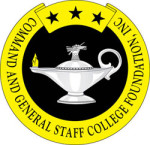
Simply enter your email address below and click the subscribe button...
We 100% respect your privacy





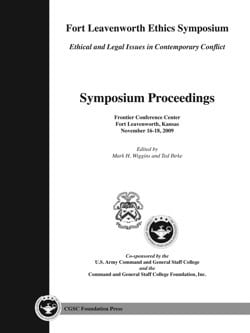
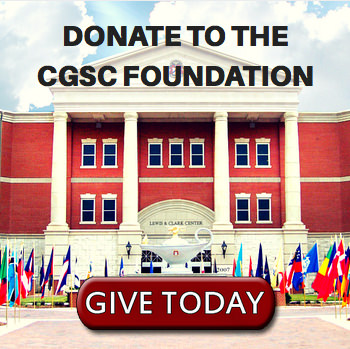
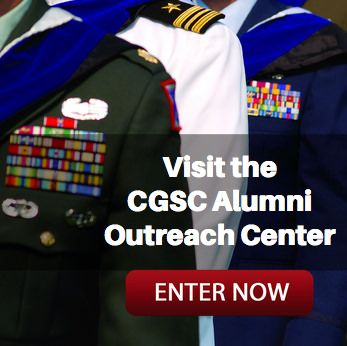


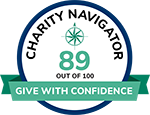


Leave a Reply